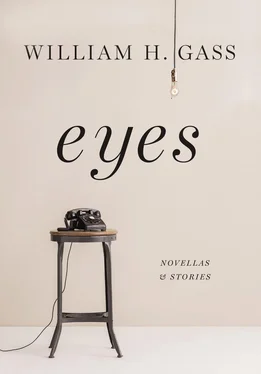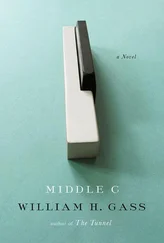The assistant, whose apparent stupidity was an effect of his seeming a suitable subject for Diane Arbus, knew, to cite one outré instance, that in a box at the back of the store, and in two Mr. Gab kept in a cleaning closet in his kitchen, were several beautiful pictures set in Sicily and shot in the early fifties by, of all people for Mr. Gab to have discovered, Enzo Sellerio: in particular one from Vizzini of the worn head and shoulders of a woman who had framed herself with a window that in turn was surrounded by rows and rows of descending roof tiles textured to a fare-thee-well — a woman whose gaze was one of total intensity, though her mouth expressed quizzicality, while on the sill lay an aristocracy of fingers, age infecting everything else — her fingers positioned as if she were emerging from the grave of days; then another taken through the flychains of a Palermo doorway so that a seated man, a horse and cart, a church front, and a couple are seen as if scrimmed by a blurring rain of o’s; or the Chiesa Madre’s quiltlike stairway viewed from above as it’s being climbed by a herd of Paternò goats…well, where could this man who went nowhere, rarely to the edge of his neighborhood, have obtained work of this quality without hanky-panky of some kind? Without a lot of miscreation going on behind the back of every member of an honest public.
Oh…yes…Mr. Gab also had a very moving photograph — perhaps a tad mellow — of some trailer-camp kids in Richmond, California, that Ansel Adams had taken with Dorothea Lange’s twin-lens Rolleiflex during the War, cropped and dodged according to his own account, and just how had that dramatic image made its way into a cello envelope and thence to a cardboard box in this silly little shop on Arsenal Avenue except if it were hiding out?
Mr. Gab was as silent about his system of supply as he was about everything else. He sold so seldom he may have been holding most of his stock for years, and in the same boxes too, long before his assistant became old enough to observe any rate of change. Nevertheless, from time to time a very big Russian-looking man in a very heavy Russian-looking coat, though not with a dead animal on his head, which would have made everyone take note, came with wild hatless hair to see, and apparently to consult with, Mr. Gab, going into his quiet private quarters for a little chat, carrying a case large flat and black. The Russian’s big bass would soften as soon as his wide back disappeared behind the rug, which Mr. Gab held open for him as though they were entering a box at the theater. How are you this very day, my boy, the big man would thunder when the stupid assistant greeted him with a wince of recognition and a pleasant surprised smile. Annduh Missterr Gahb, my boy, is he ahbought? His accent, thick as his coat, was too eclectic to be genuine, and had been faked to cover a Russian one, the assistant thought. It was then, at the card table in the company of the ceramic cat, that the case would click open to disclose, the assistant imagined, a wondrous rarity, an August Sander maybe, filched from a German collector, a labor leader in an ill-fitting unpressed dark suit, throttled tie, intense vest, like those Mr. Gab wore, hair receding so it was now a headband, and those arms at his side ending in pugnacious little fists.
But when the assistant went later to look under Sander in the German box he found only the one which had been there through uncounted years: the hotelkeeper and his wife, Gastwirtsehepaar, around 1930, Tweedledum with Tweedledee, posed outside their vine-sided hostelry, she in her polka dot dress and frontally folded arms, he in bow tie and white shirt and hanky, a startle of patches against the compulsory black suit, including vest — black too — tucked under the coat like a head hid in a camera’s hood — uh oh — there’s one button missing, one out of four, too bad, the bottoms of the innkeeper’s trousers hiked in an ungainly fashion above a pair of sturdy polished shoes, black as well, the innkeeper’s arms clasped behind him so that the swell of his stomach would suggest to a hesitant guest hearty fare; well, they were both girthy full-fleshed folk as far as that goes, her eyes in a bit of a squint, his like raisins drowning in the plump of his cheeks.
What made August Sander’s portraits so great—“great” was the appropriate word in the assistant’s opinion — was the way his sitters made visibly manifest, like the backgrounds behind them, the lives that had shaped their pictured faces and forms, as though their daily occupations had drawn them there to be displayed for the camera with all the seriousness suitable to such a show of essential self.
If you were to look at the penetrating portrait Berenice Abbott made of Eugène Atget when he was a wispy-haired old man with sunken cheeks, a mouth relieved of most of its teeth, assertive nose, and intense eyes, you might get a whiff of Mr. Gab too, for he was ancient early, grew up to reach old in a hurry, and then didn’t change much for decades, except to solidify his opinions, much the way Atget had, both men easily angered, both men hugging their habits, each short of speech, and patient as the stones Atget alone gelatinized. Mr. Gab disavowed color with the fervor of a Puritan, and nothing in the shop had a hue you’d want to name beside the dull brown cardboard and the pillow in his chair, because the walls were once a clean cream dirtied now to nondescription, and the lino floor was like a playing board of black/white squares, a design mostly seen unmopped in public toilets, while the rug he’d hung across the door to his digs was a tweed a fade away from tan.
Mr. Gab was a stickler. His ideal was the perfect picture taken on the wing with one shot, and allowed to emerge from its development like a chick its egg, so that one saw not just the subject supremely rendered but a testimony to the unerring fineness of the photographer’s eye; an eye unlike the painter’s, he claimed, because the painter constructed; the painter made up his image as if the canvas were a face; while the photographer sought his composition like a hunter his prey, and took it away clean, when it was found, to present in its purity, as the result of an act of vision, the sort of seeing no one else employed, what Mr. Gab called “slingshot sight.” Painting took too long, sculpture of course was worse, and encouraged thinking, permitted alterations, endured changes of mind; whereas the photographer came, saw, and shot in a Rolleiflex action, in one unified gesture like waving off a fly.
Mr. Gab knew Atget bided his time, did and redid; he knew that Edward Weston pulled images like putty into weird unnatural shapes; he knew that Walker Evans cropped like a farmer, August Sander as well, who also staged every shot with theatrical calculation; that Man Ray was like Duchamp, an incorrigible scamp; that Ansel Adams dodged and burned and renovated; that even André Kertész, who possessed, like Josef Sudek, a saintly sensibility, had more than once employed a Polaroid…well, Mr. Gab didn’t say very much about such lapses; he just threw up his hands, palms up/arms out, the way he did in the winter, salting his sidewalk, and said that it was beyond understanding that the same man who had taken, from an overlooking window, those pictures of Washington Square in a snow of fences — when? Nineteen seventy? well — in — anyway — a nearby year — it was dumbfounding that an artist of such supreme severity should have succumbed to Kodachromania and taken, it was said, as if he had embezzled them, two thousand Polaroids, sinking for a time as far as Cibachrome, but genius was a dark cave full of flickers; who knew what the darkness might disclose? who knew, his hands said, washing themselves in the air.
Mr. Gab forgave, and forgave again, but certain photographers had too many counts against them, like David Bailey, to mention an outstanding instance, because he bandaged the body exposing only the legendary wound with its unlikely whiskers, or did the worst sort of celebratory portrait — Yoko Ono, for god’s sake — or shot up the worst sort of scene — Las Vegas, can you imagine? — consorted with cover models, and had nudes blow chewing gum bubbles to match their bubbies or wear necklaces of barbed wire; then there was a hot lens like Irving Penn, who spent too much time in the studio, who worked for fashion magazines (advertising and news were also OUT), who photographed Marisa Berenson’s perfect bosom and Rudolf Nureyev’s perfect limbs because they were Berenson’s boobs or Nureyev’s calves, and did portraits of famous folk like Truman Capote on account of that fame, often in silly contrived poses such as Woody Allen gotten up as Groucho Marx (Mr. Gab vented exasperation), or did cutesy-pie pictures like that faucet Penn pretended was dripping diamonds, but almost worst, his malignant habit of pushing his subjects into corners where they’d be certain to feel uncomfortable and consequently conspire with the tormentor to adopt a look never before or after worn.
Читать дальше












